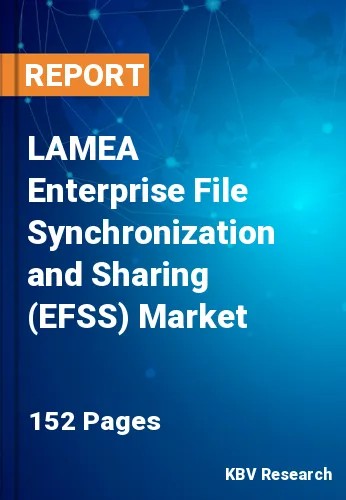The Latin America, Middle East and Africa Enterprise File Synchronization and Sharing (EFSS) Market would witness market growth of 31.4% CAGR during the forecast period (2021-2027).
Businesses utilize EFSS to better content management, collaboration, and secure file sharing, and it includes capabilities like live commenting, document version tracking, and workflow process management to assist users in storing, editing, reviewing, and sharing files. Additionally, it also has the ability to track and trace documents associated with any invoice or order in auditing. Large organizations that use EFSS need the ability to add their own access policies that manage the organization's accessibility to specific information. To safeguard company data, these products include security features like authentication, data encryption, containerization, and tracking. Because these technologies offer real-time collaboration and sharing of ideas, businesses have been attempting to increase their internal work productivity by saving their employees time spent in collaboration.
As data becomes increasingly important in practically all human activities and attains unprecedented levels of social and economic significance, a global clamor for regulation and proper legal protection has risen. In 2020, Brazil's new Data Protection Act ('Lei Geral de Proteço de Dados', or simply "LGPD") went into effect, imposing considerable new duties and responsibilities on enterprises and professionals in general.
In 2012, Ghana's government passed the Data Protection Act. 30 In contrast to many of the data protection legislation that followed the GDPR's implementation in 2016, the Ghanaian regulation provides a more flexible framework for describing both personal data and the parameters that govern legal data processing. Egypt is the most recent African country to enact a comprehensive data protection law. President Sisi signed Law No. 151 for 2020, the Egyptian Personal Data Protection Law, in July 2020, establishing a governmental system for personal data protection in Egypt. This rule reflects Egypt's recent efforts to "modernize and secure the way digital exchanges occur," according to the Egyptian government.
The Brazil market dominated the LAMEA Enterprise File Synchronization and Sharing (EFSS) Market by Country 2020, and would continue to be a dominant market till 2027; thereby, achieving a market value of $519 million by 2027. The Argentina market is estimated to grow at a CAGR of 32.1% during (2021 - 2027). Additionally, The UAE market would display a CAGR of 31% during (2021 - 2027).
Based on Component, the market is segmented into Solution and Services. Based on Solution Type, the market is segmented into Standalone and Integrated. Based on Services Type, the market is segmented into Professional Services and Managed. Based on Organization Type, the market is segmented into Large Enterprises and Small & Medium-sized Enterprises (SMEs). Based on Deployment Mode, the market is segmented into Cloud and On-premise. Based on Vertical, the market is segmented into BFSI, Software & Technology, Government & Public Sector, Healthcare, Education & Legal, Retail and Others. Based on countries, the market is segmented into Brazil, Argentina, UAE, Saudi Arabia, South Africa, Nigeria, and Rest of LAMEA.
Free Valuable Insights: The Global Enterprise File Synchronization and Sharing (EFSS) Market is Predict to reach $5.4 Billion by 2027, at a CAGR of 26.7%
The market research report covers the analysis of key stake holders of the market. Key companies profiled in the report include IBM Corporation, Box, Inc., Microsoft Corporation, VMware, Inc., Google LLC, OpenText Corporation, Thomson Reuters Corporation, Dropbox, Inc., Citrix Systems, Inc., and BlackBerry Limited.
By Component
By Solution Type
By Services Type
By Organization Type
By Deployment Mode
By Vertical
By Country
Companies Profiled
Our team of dedicated experts can provide you with attractive expansion opportunities for your business.

